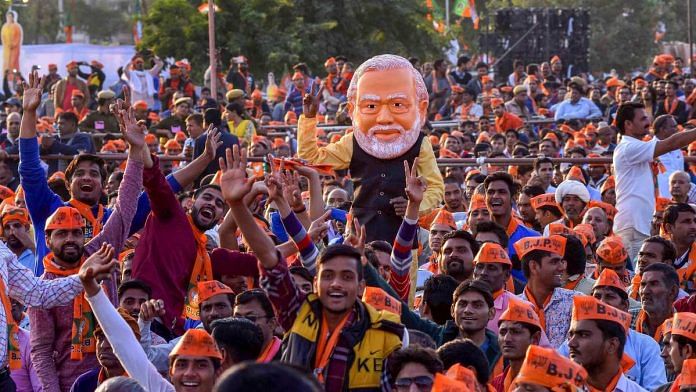Implementation of the vote-catching decision, finalised by the Union Cabinet Monday, will require deft political maneuvering.
New Delhi: If things go according to plan, the Narendra Modi government will introduce a bill – a Constitution amendment bill – on Tuesday, the last day of the ongoing Parliament session, to provide for 10 per cent reservation in jobs to economically weaker sections among the general category citizens.
The implementation of this vote-catching decision, finalised by the Union Cabinet Monday, will require deft political maneuvering: it requires two-thirds support in both houses of Parliament as well that of one half of the state legislatures.
The move is clearly aimed at bringing back the disgruntled upper caste voters into the BJP fold, but it has the potential to further alienate the marginalised sections, particularly the OBCs. The latter have been demanding reservations in education and jobs. The move also signals that the BJP is now unsure of the support of the Scheduled Castes and Scheduled Tribes.
The fine-print of how the Modi government intends to clear the hurdles in making the weaker sections among the upper castes happy is still unclear but the move raises several questions.
Also read: Why Modi government’s quota move may not yield the results it wants
Is it constitutionally permissible?
No, not under the existing scheme. The amendment will have to pass the test of the law laid down by the Supreme Court in various judgments, particularly the Indra Sawhney case, where a Constitution bench ruled that reservations couldn’t go beyond 50 per cent.
The caveat was that the rule could be relaxed in favour of people from far-flung and remote areas because of their peculiar conditions but only on the basis of quantifiable data.
The highest court of the land has held, repeatedly, that reservations are meant only for the upliftment of the “socially and economically backwards” sections of society. While financial backwardness can be one of the reasons for granting reservations, it can’t be the sole criteria.
More importantly, Indra Sawhney had held 10 per cent reservation to economically backward people of general category as unconstitutional.
What’s the process once government introduces amendment bill?
The government can introduce a bill to amend Articles 15 and 16 of the Constitution in the Lok Sabha or Rajya Sabha tomorrow. The bill will have to be passed by a two-thirds majority of the members present and voting in each House, with at least one-half of the members present and voting.
Once passed by both Houses with the required majority, the bill will then be sent to the states where it will have to ratified by at least one-half of the state legislatures by a two-thirds majority. There is no time limit on how long the states can take to do this.
Can amendments be challenged at any stage?
Yes, theoretically, the amendments can be challenged in the Supreme Court or any high court at any stage. But the courts normally intervene only after the cause of action has arisen, which, in this case, would mean the bill having been passed and received President’s assent.
Who will be covered by the amended law?
A great deal will depend upon the fine-print. Sources in the government told ThePrint that the government intends to classify a person as economically-weak if his/her annual income is less than Rs 8 lakh; he/she own agricultural land of less than five hectares; he/she has a house smaller than 1,000 square feet, he/she owns residential plots below 109 yards in notified municipalities or below 209 yards in non-municipality areas.
Also read: Five reasons why the BJP’s upper-caste quota gambit could backfire
Will the new reservation be caste-based?
No. Members of all upper castes, who fulfil the criteria of being economically weaker, will be entitled to jobs under the new reservation rules. The government will also have to include a clause in the amendment bill to increase the cap in the reservation pie from the current 50 per cent to 60 per cent.
Is this the first time such a move is being considered?
No. The P.V. Narasimha Rao government issued an office memorandum (OM) on 25 September 1991, to enable the poorer sections to receive the benefits of reservation on a preferential basis and to provide reservation for other economically backward sections of the people not covered by any of the existing schemes of reservation.
However, the Supreme Court declared the OM was “unenforceable”.
The bench also ruled that “identification of a group or collectivity by any criteria other than caste, such as, occupation-cum-social-cum-educational-cum-economic criteria ending in caste may not be invalid”.
The same bench also allowed the State to provide for reservation on the basis of “economic backwardness” if the state was able to find a mechanism to ascertain inadequacy of representation of such class”.




Regarding the procedure to amend the articles 15 and 16, is the ratification by the states required?
You have written wrong basis bcoz it is “Social and educational backwardness” not “Social and economic backwardness” as claimed.
Thank u…